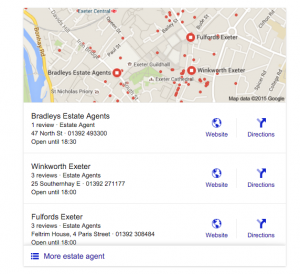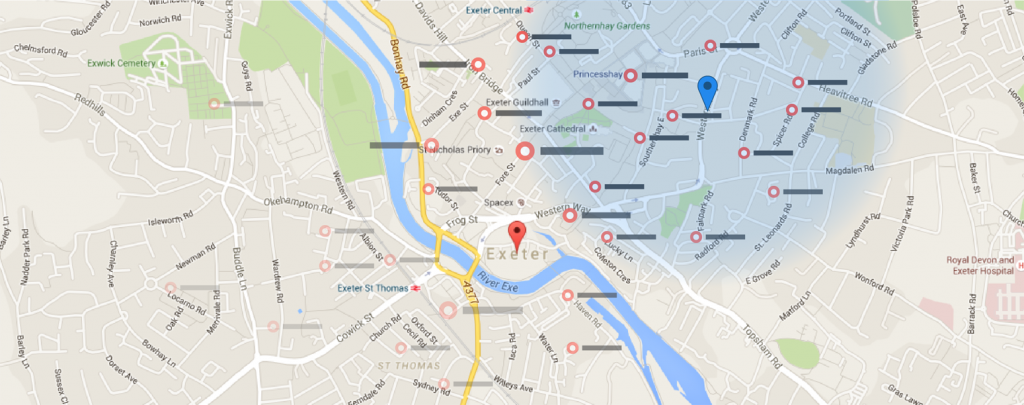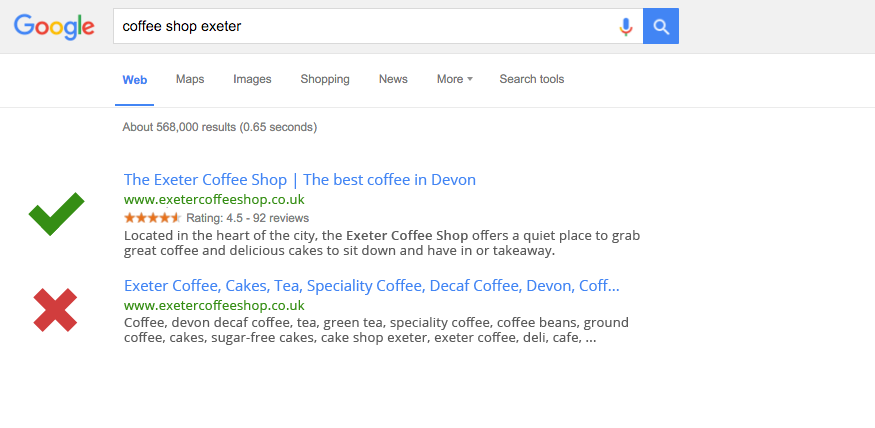5 things you need to do to improve your Google local ranking
19 October 2015
By H
In early August 2015, Google had one of its biggest shake-ups in recent months when it made changes to the results of local business searches. Although there were no changes to the ranking factors themselves, the most significant change was the move from displaying the usual ‘7-pack’ to just 3 results, now referred to as the ‘snack-pack’. The result of this was that ranking for Google local business results, which now appear in prime real-state above all of the organic search results, has become incredibly more competitive. More results can be accessed via a click below although the results outside the top three have far less exposure.
Any business that is localised to a town, city or an area should consider ranking well for Google local results as this now offers as-good-as, if not better exposure than normal organic results. I have researched this topic in great depth as these changes had some effect on our clients’ ranking and we have worked to identify means to improve their Google local ranking. At SEM East in New York, I had the opportunity to speak directly with the Product Managers from Google about how we can improve ranking following these changes. Here are five things I have identified as key actions to help improve your Google local ranking.
1) Check that your online business listings are accurate and consistent
Google’s a smart old bean and is able to cross-reference your listed address from your website, Google+, Internet Yellow Pages, Google My Business, your own website, social media profiles etc. Recent studies have suggested that the biggest negative ranking factor for Google local is either having inconsistent addresses, or an incorrect business address. For businesses with a fixed service address (shops, clinics, estate agents etc.), there used to be some sense in attempting to list your address as closer to a search centroid. So when you search “coffee shop exeter”, the search centroid would be the geo centre point for Exeter which is down near Exe Bridges somewhere, and so being ‘located’ closer to that was better. That is not the case anymore, as Google takes the location of the searcher as the centroid now. Google will preference businesses that are located closer to the searcher’s location as a ranking factor.
Google claims that if the search is taking place on a mobile device then this only applies if ‘location services’ are enabled, however, we carried out a few tests and it appears that with ‘location services’ turned off, your location is still accounted for (sneaky Google). If your business does not have a fixed service address then you can specify a ‘service area’ in your Google My Business profile.
Takeaway message: check all of your online business listings and make sure they are accurate and consistent.
2) Improve how your business appears on the Google results page
Specifically, you want to improve the click-through rate (CTR) of your website from Google. This refers to the percentage of people that see your website on the Google results page and actually click on it. This is one of the key measures Google uses to identify that a high percentage of people who see your website listed actually want to click through onto it, thus making it worthy of this prime real-estate. In theory, if your CTR was 0%, then this would outweigh everything else as a ranking factor, as Google would take this to mean that your website is not fulfilling the need of the searcher. The way to improve this is to review the metadata of the page of your website that appears in the search results including the ‘page title’, ‘meta description’ and if possible the actual URL. These are the bits of information that the searcher sees in the Google results and so they need to effectively communicate a message. Although this information does not show in the Google local results, well written metadata will improve the CTR of your organic search result which, in-turn, will have a positive effect on your Google local ranking. If you want more information on how to improve your website’s metadata and overall SEO score, find out about how you can attend one of our free seminars here.
Takeaway message: Improve the quality of your metadata to increase the CTR.
3) Get more Google reviews!
A big focus following these recent changes is to get more good quality online reviews. Although Google has a list of trusted review websites that it pulls information from, we would recommend getting more reviews from your customers directly through Google. Importantly, these reviews need words! Although simple out-of-five star reviews are good, there is a greater preference for the number of reviews with text. Even better are reviews with text that include your targeted keywords. Find a simple incentive for your customers, such as a discount or a free item or session to leave a (good, hopefully!) review for you on Google with text, e.g. “Write a couple of lines about our ‘speciality coffee’ and get a muffin on the house with your next coffee”. We would strongly recommend you avoid fabricating reviews as Google has stated that it can pick up on these and will penalise your website if it does so.
Takeaway message: Encourage more of your customers to leave Google reviews with text.
4) Improve your website’s credibility
Search engines have a complex way of gauging how credible your website is with a measure known as PageRank by Google, or referred to by Moz as domain authority. This is an attempt to determine whether or not people use the website, talk about the website and if the website is recognised by other same-industry bodies (please note that this a domain authority in a nutshell – it is vastly more complex than that). Domain authority is widely regarded as one of, if not the, most important organic ranking factor and it is also believed to be greatly important for Google’s local results. Put simply, to improve your website’s credibility you want to remove bad links and gain good ones. To remove bad links to the website, use Google’s Search Console to identify the links and request their removal. Failing that, disavow them. To gain good links, you can either engage in content marketing to produce highly valuable information that will naturally encourage people to share and link to it. Alternatively, speak to one of our team about how we can help you improve your website’s domain authority.
Takeaway message: Increase the credibility of your website by removing bad links and gaining good ones.
5) Clean up your web presence and introduce some strategy
Let’s break this into its parts. Firstly, what do I mean by clean up your web profile? All of Google’s recent major algorithm updates have all been focussed on rewarding quality and removing spam content. In an attempt to improve the overall UX of Google (and possibly of the internet also), quality content is preferred over blatant search engine optimisation. Therefore, your website’s metadata and on-site content should focus on well-written content rather than simply stuffing in keywords and trying to target every search phrase imaginable. You will notice some of the results that appear have horrible content that either just cram in as many keywords as possible, or is drawing from the wrong part of the web page.
Secondly, introduce some strategy. Determine what keywords you want to target and try to optimise a page for a single keyword or key phrase only. The current best practice is also to extend your keywords using synonyms throughout the content as this helps increase the relevance of your content whilst avoiding ‘keyword stuffing’, the bad practice of simply putting in loads of keywords.
Takeaway message: Identify what keywords you want to target and improve the content of a specific page orientated around them.
Conclusion
As the biggest difference between ranking well in the organic results and ranking well in the local results is location of searcher, there is an element of this that you can’t control. If a competitor is located closer to a search hotspot (i.e. the high street), they have an advantage. However, if your website consists of great content, well-structured meta data and has loads of great reviews then these factors may outweigh the effect of location and result in you ranking above the competition. If you’d like to find out more about how you can improve your online presence, please feel free to get in touch with me.
HCW.


